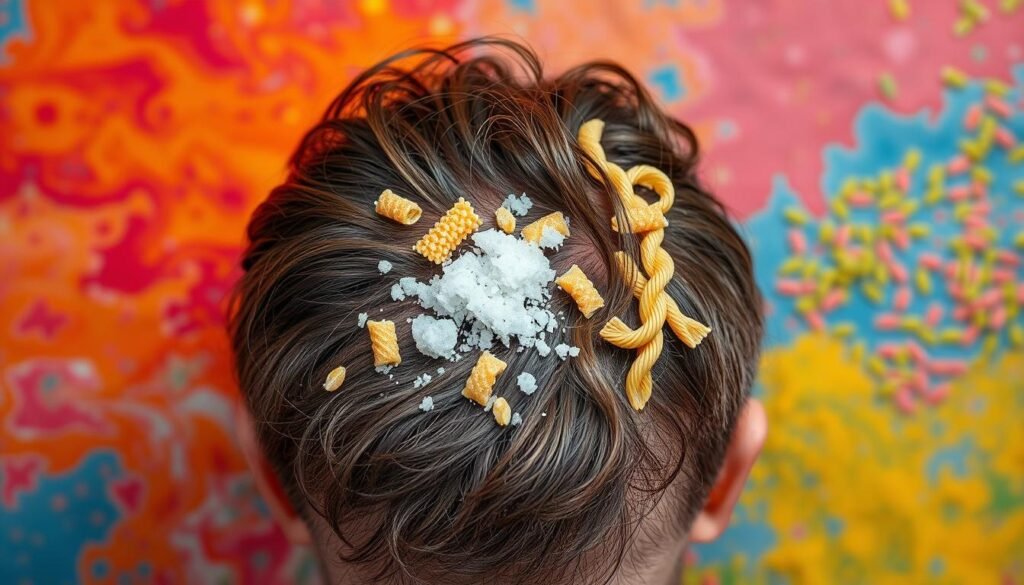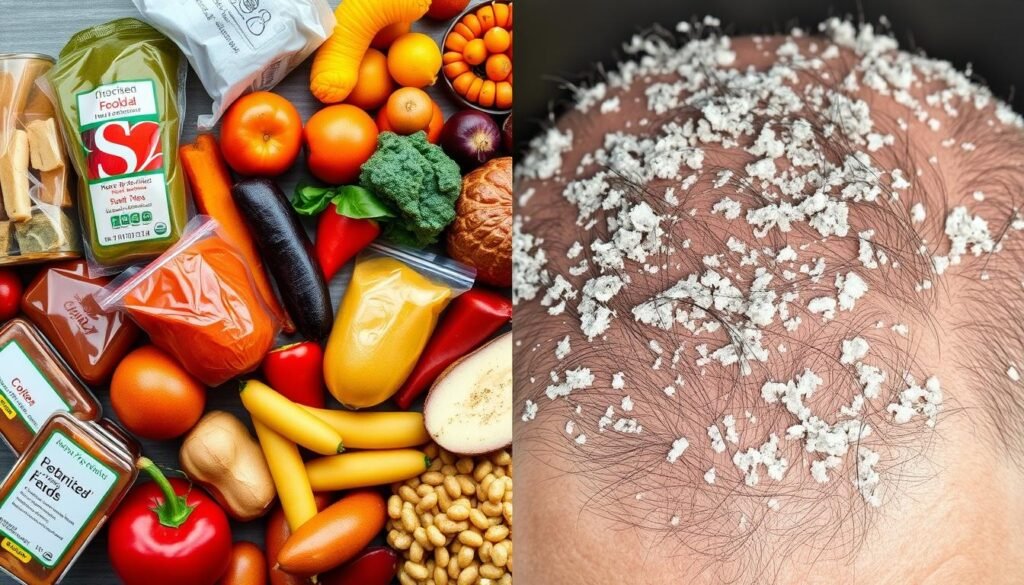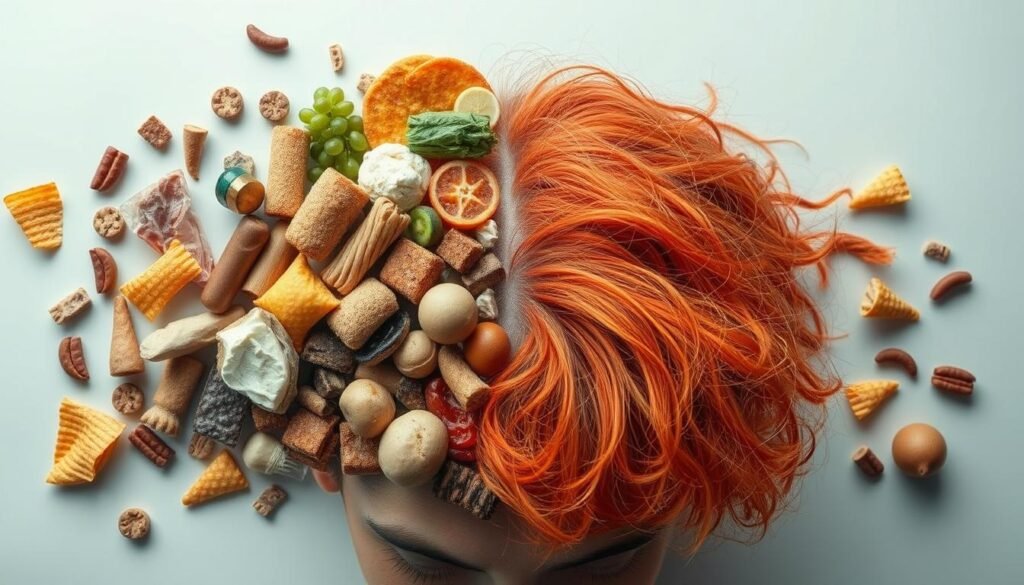Did you know 72% of those with severe scalp issues link their diet to dandruff? This surprising find points to a big problem that many overlook. The shift towards eating more processed foods leads to scalp flakes, itching, and more. Although hard proof linking diet to dandruff is scarce, doctors see hints that better eating might ease these symptoms.
In learning about dandruff’s causes, we see how diet influences our scalp’s health. Processed foods, loaded with sugar and bad fats but missing key nutrients, could be culprits. Recognizing this could be the first step to getting a healthier scalp and fewer flakes.
Key Takeaways
- Many people believe their diets contribute to dandruff severity.
- Processed foods are often high in sugars and unhealthy fats.
- A diet rich in fruits and vegetables may help manage dandruff.
- Essential nutrients like zinc and B vitamins play a role in scalp health.
- High sugar intake can promote conditions favorable for dandruff.
Understanding Dandruff: Causes and Symptoms
Dandruff is when dead skin cells flake off the scalp. It can make you feel itchy and irritated. Things like dry skin, an oily scalp, and conditions such as seborrheic dermatitis or psoriasis play a role in causing dandruff. About 42% of babies get seborrheic dermatitis on their scalp, face, and diaper area. Also, men and those assigned male at birth might get dandruff more because their skin makes more oil.
The main signs of dandruff are visible flakes, which can be off-white or yellow. You might also see flakes on your eyebrows, beard, mustache, or behind your ears. Plus, there’s often redness and lots of itching. Dandruff usually starts after puberty because that’s when oil glands get busier. A big reason for dandruff is too much malassezia yeast on the scalp, which loves oily skin.
Being really stressed out or in cold, dry weather can make dandruff worse. Hair products can also upset your scalp and cause inflammation. If your immune system is weak or if you have certain neurological issues, you might get dandruff more easily. Keeping your scalp clean and healthy is key to controlling dandruff.
| Causes | Symptoms |
|---|---|
| Dry Skin | Flaking Skin |
| Oily Scalp | Itchy Scalp |
| Malassezia Yeast Overgrowth | Visible Flakes |
| Reactions to Hair Products | Redness |
| Cold, Dry Weather | Flakes on Facial Hair |
The Role of Inflammation in Dandruff
Inflammation is crucial in causing and worsening dandruff. It leads to scalp irritation, redness, and flaky skin. Diet and some health conditions also play a part. A lot of young people deal with this, showing how common it is.
During bad dandruff periods, our scalp sheds many more cells than usual. This happens because of a yeast called Malassezia that grows fast. This growth causes our body’s defense systems to react and makes dandruff worse.
What we eat affects dandruff too. Sugary foods and processed carbs can make our bodies produce more oil. This extra oil can irritate our scalp more and make dandruff worse. Eating less sugar and junk food helps with managing these issues.
Eating the right fats like omega-3 and omega-6 helps fight inflammation. Foods rich in protein, zinc, and biotin also support scalp health. Making these diet changes can reduce dandruff and make our scalp feel better.
Processed Foods and Dandruff: What’s the Connection?
The link between processed foods and dandruff is getting more attention. Eating lots of refined sugars and processed carbs can upset the balance of microbes on your scalp. This often leads to more yeast overgrowth, a main cause of dandruff.
Eating a lot of processed foods can cause insulin levels to spike. This may make your scalp oilier, worsening dandruff. Cutting down on sugary foods can help control it. For tips on what to eat, check out this informative article.
Making better food choices can also improve your skin health, helping to prevent or ease dandruff. Eating fewer processed foods is good for your scalp and your overall health.
How Sugar and Processed Carbs Affect Scalp Health
Diet plays a big role in maintaining scalp health, especially when it comes to dandruff. Sugar and Processed Carbs are key players. They can cause insulin levels to spike quickly. This can lead to inflammation and more oil production, affecting the scalp.
The Impact of High-Glycemic Foods on Insulin Levels
High-glycemic foods are common in processed diets and cause big insulin spikes. These spikes may make the scalp produce too much oil. High insulin levels also fire up certain hormones. These make the scalp oily. Too much oil can then invite microorganisms that make dandruff worse.
Link Between Sugars and Increased Oil Production
Eating too much sugar can lead to skin that flakes and itches. This worsens scalp health. To fight dandruff, it’s smart to eat low-glycemic foods. They can help keep insulin levels even, control oil production, and ease dandruff problems.

Want to learn more about dandruff and hair health? Check out this helpful article for more details.
Nutrient Deficiency and Its Effect on Dandruff
Lack of certain nutrients can lead to dandruff and scalp problems. It’s important to eat a variety of nutrient-rich foods to keep your scalp healthy. Not getting enough Zinc and B Vitamins can weaken the skin on your scalp. This can make it easier for scalp irritation to happen. Knowing which nutrients keep your scalp in good shape can help fight off dandruff.
Essential Nutrients for Healthy Scalp: Zinc and B Vitamins
Zinc keeps your skin and hair in good condition. People with low zinc might face hair loss and weak hair. B Vitamins, like biotin, are also crucial for your scalp. They help your cells work right and make your hair strong. Missing these from your diet can make scalp problems and dandruff worse.
Omega-3 Fatty Acids: Their Role in Reducing Inflammation
Omega-3 fatty acids can reduce inflammation, calming the scalp and easing dandruff signs. You can find them in foods like fish, seeds, and nuts. These fats are good for your skin and help soothe an irritated scalp. Adding them to your diet can counteract the bad effects of not getting enough nutrients, improving your scalp condition.
| Nutrient | Sources | Role in Scalp Health |
|---|---|---|
| Zinc | Meat, shellfish, legumes | Supports skin barrier and hair structure |
| B Vitamins | Eggs, whole grains, leafy greens | Promotes cellular function and hair growth |
| Omega-3 Fatty Acids | Fatty fish, flaxseeds, walnuts | Reduces inflammation and improves scalp hydration |
The Influence of Food Additives and Preservatives
Food additives and preservatives are important in today’s diets. But, they do more than just make food last longer. These ingredients can hurt your scalp health, causing dandruff and irritation. Some people find they react badly to certain food additives, with symptoms like itching and flakiness.

Many preservatives and additives can worsen scalp problems. For example:
- Artificial preservatives such as nitrates and sulfites may cause skin issues and breathing difficulties.
- Emulsifiers like guar gum and xanthan gum can upset your stomach and impact nutrient absorption. This affects your scalp’s health.
- Carrageenan, a thickening agent, is linked to stomach issues, but allergic reactions to it are rare.
It’s vital to read food labels if you’re worried about your scalp health. Watch for ingredients that might cause reactions, especially in processed foods like sauces, juices, and baked items. Being aware of food additives is key to making good dietary choices and protecting your scalp health. This is essential for overall well-being.
Eating more fresh fruits, vegetables, and whole foods can help lessen the negative impacts of food additives and preservatives. Choosing natural options can improve your diet and your scalp health. By knowing how these ingredients affect you, you can make smarter food choices. This helps keep your scalp and body healthy.
How Dietary Fats Impact Dandruff Severity
Dietary fats play a big role in how serious dandruff can get. It’s vital to know the difference between good and bad fats for dandruff care. Foods like olive oil, avocados, and fatty fish are full of healthy fats. These fats provide nutrients that keep your skin healthy and may help reduce dandruff.
On the other hand, bad fats found in fried and processed foods can make dandruff worse. These fats can cause inflammation and make your scalp’s condition decline.
The Role of Good Fats vs. Bad Fats
Dietary fat quality affects our health deeply, including dandruff. Emphasizing healthy fats can help make dandruff less severe. This part looks at both fat types and what they mean for our scalp’s health.
| Type of Fat | Sources | Impact on Dandruff Severity |
|---|---|---|
| Good Fats | Olive oil, avocados, fatty fish (salmon, mackerel) | Help to reduce inflammation and promote skin hydration |
| Bad Fats | Trans fats (fried foods, margarine), processed snacks | Increase inflammation, worsening dandruff symptoms |
Studies suggest that a diet rich in healthy fats helps control dandruff. Adding these good fats to your diet could improve your scalp’s health and reduce dandruff episodes. Avoiding bad fats is crucial too, as they can trigger more inflammation and worsen dandruff.
Inflammatory Foods to Avoid for a Healthy Scalp
Keeping a healthy scalp means watching what you eat. Many foods in American diets cause inflammation. This can make dandruff worse. Choose your foods wisely to make your scalp healthier and less flaky.
Common Inflammatory Triggers in the American Diet
Some everyday foods can cause inflammation. Here are a few big ones:
- Refined sugars: Found in sweet drinks and snacks, these promote body inflammation, leading to more dandruff.
- Processed carbohydrates: Items like white bread and pastries can raise your blood sugar, causing scalp issues.
- Alcohol: Sugary drinks such as white wine and champagne can mess with your blood sugar, causing more scalp flakiness.
- Dairy: Cheese and full-fat dairy can be tough to digest, leading to inflammation and a flaky, itchy scalp.
The Effect of Alcohol and Dairy on Scalp Health
Alcohol and dairy have a big impact on scalp health. Sweet alcoholic drinks can raise blood sugar levels. This can increase flakiness. Eating more fruits might lower the risk of problems like seborrheic dermatitis by 25%. Try eating more fruit and less alcohol for a healthier scalp.
Dairy, especially full-fat types, can also hurt your scalp. Cheese and cream cause inflammation, which can lead to dandruff. If your scalp is giving you trouble, eating less dairy might help you see improvement.

Improving Scalp Health Through Dietary Changes
Changing your diet can really help your scalp health. Eating foods rich in antioxidants fights oxidative stress and boosts scalp health. Add lots of fruits, veggies, and whole grains to your meals. These foods are packed with nutrients like zinc, vitamin A, and omega-3 fats. They keep the scalp’s oil levels balanced and prevent it from getting dry.
Incorporating Antioxidants and Nutrient-Rich Foods
Eating foods with antioxidants helps reduce scalp inflammation. Foods high in vitamins A, C, and E are especially good for you. A medium sweet potato has enough beta carotene to meet 160% of your vitamin A needs. A yellow pepper gives 456% of your vitamin C needs daily. These vitamins keep the scalp’s pH balanced, stopping dryness, itching, and dandruff. Nutrition is key in controlling dandruff and keeping hair healthy.
Hydration and its Importance for Scalp Wellness
Staying hydrated is crucial for a healthy scalp. Drinking enough water keeps the skin barrier strong, reducing flakiness and irritation. It’s also important to eat nutrient-rich foods. Omega-3 fats, found in fish and flaxseeds, improve blood flow to hair roots. Spinach gives you 20% of your daily vitamin A, and almonds provide 48% of your vitamin E, promoting hair growth. Good hydration and nutrients are essential for strong, healthy hair.
Conclusion
The link between processed foods and dandruff is clear. Eating too many refined carbs and sugars can make dandruff worse. A healthy diet full of antioxidants and anti-inflammatory foods helps your scalp stay healthy. Important factors include sebum production, hydration, and the scalp’s microbes. It’s key to eat foods rich in zinc and omega-3s for your scalp.
Adding foods good for your scalp to your diet is crucial. Avoid fried foods and dairy and look into herbal treatments or medicated shampoos. If you need more help, talk to a healthcare professional for advice. By choosing the right foods and caring for your scalp, you can fight off dandruff. Check out more about fighting dandruff here.
Knowing how processed foods relate to dandruff lets us make smarter choices. With the right approach, a healthier scalp is possible.